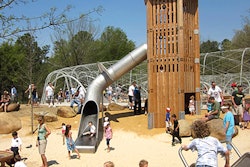You may have seen the protest signs: “Stop Crape Myrtle Murder!” It seems for every vibrantly blooming and well maintained example of Lagerstroemia adorning properties from Texas to Savannah, there is one with its limbs hacked off by the uniformed. Enter, the Save the Crape Myrtles Organization whose mission is to prevent the odious practice of over pruning these graceful trees. Its founder, Robert Donohue, provides these non-litigious general care pointers:
Pruning
Prune in the end of winter to beginning of spring, February to March (cooler zones, March to April). Remove all dead limbs, small crisscrossing and obstructive limbs and suckers around the base of the tree. Also, remove limbs to balance out the canopy.
Installation
Choose a location that allows many years of growth. “Let it show off its natural form,” Donohue says. Dig a rough hole to prevent root girdling. Backfill with native soil and drench with water. Install root flare slightly above existing grade. Use stakes and guy wires for alignment and stability.
Mulch
Shape mulch ring in a bagel shape to act as a bowl to help direct water to the roots.
Fertilization
Test soil and use a good local organic combination of granular organic plant foods for trees and shrubs, compost liquid seaweed/fish emulsion/molasses. Use foliar spray and soil drench.
Irrigation
Properly shaped mulch ring works well with bubbler spray heads, drip irrigation, subsurface aeration with drip systems and hose end watering.
Pest Management
Spray sulfur and lime-based foliar treatment in areas where powdery mildew is a threat. Use insecticidal soap for aphids and spray hose nozzle at high water pressure to dislodge other insects.









